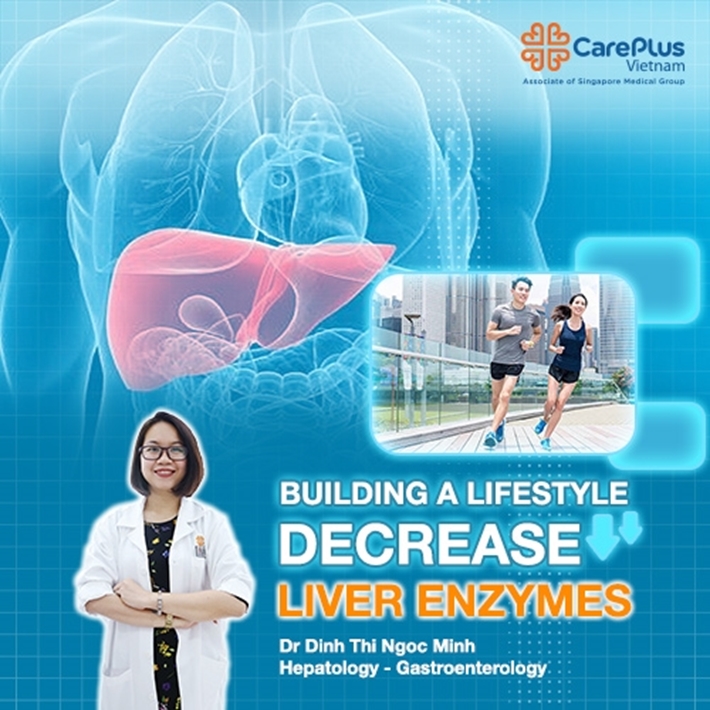Build a lifestyle to reduce liver enzymes
Elevated liver enzymes is a sign that the liver is damaged and releasing liver enzymes into the bloodstream. When the test shows an increase in liver enzymes, you must see a gastroenterologist to find the cause of treatment

9/14/2022 9:04:02 AM
Common causes of elevated liver enzymes are alcohol abuse, drugs or chemicals, fatty liver, viral hepatitis. There are also other rare causes such as autoimmune hepatitis, biliary fibrosis, hypothyroidism, etc.
HOW TO PROTECT YOUR Liver
There is a saying that prevention is better than cure, that also applies to liver diseases. Currently, we are bombarded with a lot of confusing information about “detox”, “liver detox” programs with promising advertisements and very high costs. But most of them have not been scientifically proven and agreed upon. In fact, to have a healthy liver is very simple and almost anyone can do it! We have 13 ways to get a healthy liver as follows:
1, Maintain a healthy weight.
If you are obese or overweight you are more likely to develop fatty liver, this condition will cause steatohepatitis and even cirrhosis, liver cancer. So, losing weight if you are overweight is one of the most important ways to clean up fat in the liver
2, Have a balanced diet.
We should limit foods high in energy, saturated fat, refined carbohydrates (for example, white bread, coated rice or common noodles) and sugar. Do not eat raw or rare shellfish. A perfect menu for the liver is a meal that contains a lot of fiber (from fresh fruits, vegetables, bread, rice and whole grains), meat (but limit red meat), milk (dairy). low fat and possibly low in cheese) and good fats (which are monounsaturated or polyunsaturated fats such as vegetable oils, nuts, legumes and fish). Finally, be sure to drink enough water.
3, Exercise regularly
Regular exercise helps you burn triglycerides for energy and reduce liver fat.
4, Avoid toxins harmful to the liver
Limit direct contact with cleaning chemicals, insecticides and industrial additives. When using aerosols (such as mosquito spray, insecticide spray...) should ensure ventilation and wear a mask. No smoking
5, Use alcohol sensibly
Alcohol use can cause many health problems. Alcohol can destroy liver cells and cause cirrhosis. You should talk to your doctor to find out how much alcohol you can drink. Depending on your medical condition, you can continue to use alcohol in moderation or stop completely.
6. Don't Use Unlicensed Drugs
Includes drugs such as marijuana, cocaine, heroin, hallucinogens, non-medical sedatives, psychotropic drugs
7, Avoid using contaminated needles
When being stabbed by a sharp object or a used needle, you should seek medical attention immediately because it can be a transmission route for dangerous diseases such as HIV and hepatitis B or C. Therefore, we should only use needles. Sterile and unused for injection or tattooing or piercing.
8, Seek medical attention immediately if you have contact with other people's blood or secretions.
9, Do not share personal hygiene items such as razors, toothbrushes, nail clippers because they can carry pathogens caused by blood or secretions of the sick person.
10, Safe sex
Having unprotected sex or having multiple partners increases your risk of getting hepatitis B and C
11, Wash your hands
Washing hands after using the toilet or before cooking helps prevent hepatitis A infection
12, Use medicine according to medical instructions
When you take drugs that are not prescribed, such as overdose, wrong disease, or sharing inappropriate drugs, it can also damage your liver. You should not take any medication with alcohol. You should tell your doctor about all the medicines you are taking, including dietary supplements and herbal medicines, because many cases of hepatitis are caused by these drugs.
Finally, you should be fully vaccinated against hepatitis B and A to protect your liver.
Liver disease screening, periodic health check-ups are essential at CarePlus clinic to detect and treat the disease as soon as possible for you and your family.